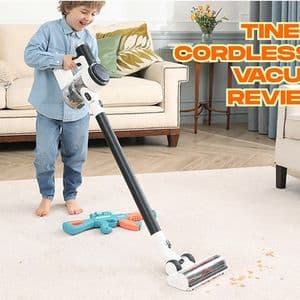Why This Comparison Matters
You might be wondering:
“Is a Ryobi stick vacuum truly that different from a Dyson?”
While they look similar in form, these vacuums differ in build priorities, battery technology, design philosophy, and performance consistency on different floor types.
A Quick Look at Ryobi Stick Vacuums
Ryobi is known for its power tool ecosystem, and its stick vacuums often align with the same interchangeable battery system many Ryobi users already own.
These vacuums emphasize:
-
Simplicity and tool-like durability
-
Easy battery swaps within the Ryobi ecosystem
-
Moderate suction power for everyday debris
They tend to focus on practicality for users who already own Ryobi tools rather than on premium features.
Understanding Dyson Stick Vacuums
Dyson has become almost synonymous with cordless stick vacuums, emphasizing advanced cyclonic technology, filtration, and a sleek design with high suction.
Dyson stick vacuums often feature:
-
Multiple suction modes with adjustable power
-
Advanced filtration for fine dust capture
-
Lightweight builds with strong airflow systems
These vacuums are designed for those seeking advanced cleaning power, particularly in homes with pets, carpets, and fine dust concerns.
Key Feature Comparison: Ryobi vs Dyson Stick Vacuums
Now, let’s dive into direct comparisons to see how they differ in practical, day-to-day cleaning.
Design and Build
Ryobi:
-
Utilitarian, with visible connections and practical parts
-
Typically bulkier but easy to maintain
-
Batteries often compatible with other Ryobi tools
Dyson:
-
Sleek, minimal designs with integrated parts
-
Lightweight and easy to maneuver around furniture
-
Batteries are specific to the vacuum but designed for balanced weight distribution
Battery and Run Time
Run time varies by model and suction mode. Dyson often includes higher-capacity batteries optimized for its motor technology, while Ryobi benefits from swappable batteries but may have shorter run times per battery.
For those interested in the longest run time cordless vacuum, Dyson high-capacity models typically last longer per charge under standard modes, while Ryobi users can swap batteries for continuous cleaning if they own spares.
Suction Power and Performance
Dyson vacuums generally offer stronger suction with advanced cyclonic separation, which helps capture fine dust and maintain suction even as the bin fills.
Ryobi vacuums offer practical suction suitable for surface debris, small messes, and daily quick cleaning but may require multiple passes for heavier dirt or carpets.
Filtration
Dyson prioritizes advanced filtration, capturing microscopic dust, which can be beneficial for allergy management.
Ryobi uses simpler filtration, typically a standard washable filter, focusing on ease of maintenance.
Usability Differences
Here’s the deal:
While both are cordless stick vacuums, how you use them can differ day-to-day.
Weight and Handling
-
Dyson: Often lighter, easier to push on carpets, and more maneuverable for cleaning stairs or car interiors.
-
Ryobi: Heavier in the hand but straightforward, with simple controls.
Dust Bin Emptying
Dyson features a point-and-shoot mechanism that ejects debris cleanly, minimizing contact with dust.
Ryobi uses a more traditional bin that requires manual emptying, which can be messier but straightforward for users accustomed to shop vacs or traditional dust bins.
Attachments and Accessories
Dyson typically includes a variety of tools:
-
Crevice tool
-
Mini motorized brush
-
Soft dusting brush
Ryobi usually offers fewer accessories, focusing on the core vacuum functionality rather than specialized tools.
Read more: https://toolhome.org/dyson-akkusauger-test/
Maintenance Considerations
It’s easy to overlook, but maintenance impacts long-term usability.
Dyson:
-
Needs regular filter cleaning (washable)
-
Dust bin and cyclone need occasional wipe-down
-
Roller brush may require hair removal
Ryobi:
-
Washable filters
-
Simpler roller brush cleaning
-
Easier battery removal for charging or replacement
Both require maintenance, but Dyson may need slightly more attention due to its advanced cyclone system, while Ryobi’s simplicity makes maintenance quick.
Cost Perspective
While this article does not promote products, it’s important to note:
-
Dyson vacuums tend to be significantly more expensive, reflecting advanced engineering, filtration, and suction power.
-
Ryobi vacuums are more budget-aligned, with the potential cost benefits if you already own Ryobi batteries.
This difference often influences buyer decisions based on how frequently the vacuum will be used and what surfaces are being cleaned.
When Each Vacuum Makes Sense
Thinking practically:
-
Ryobi stick vacuums are useful for quick, light cleaning in workshops, garages, and around the house, especially if you already have Ryobi batteries.
-
Dyson stick vacuums are suited for users seeking advanced filtration, consistent suction for pet hair and dust, and a lightweight vacuum for daily home cleaning.
Performance in Real-World Cleaning
Here’s a scenario:
You need to clean high-traffic carpeted areas quickly and effectively. A Dyson may handle deeper debris in fewer passes due to its suction power.
If you’re cleaning sawdust in your garage or quickly picking up surface dirt in a workshop, a Ryobi stick vacuum can handle the job well, especially if you have a battery ready to swap when needed.
The Role of Cordless Vacuums in Modern Cleaning
Cordless vacuums have evolved to replace traditional vacuums for many daily cleaning needs, with brands like Ryobi and Dyson contributing to this shift.
They allow quick, hassle-free cleaning without cord management, storage issues, or heavy lifting. It’s worth noting that the battery-powered design aligns with the increasing preference for convenience in modern households.
For users exploring broader vacuum comparisons, understanding where stick vacuums fit among upright, robot, and canister vacuums helps clarify expectations regarding power, convenience, and use cases.
Final Thoughts
The Ryobi stick vacuum vs Dyson discussion comes down to your priorities:
-
Do you want strong suction, advanced filtration, and a sleek, lightweight build for regular home cleaning? Dyson typically meets these needs.
-
Do you prioritize practicality, affordability, and battery system compatibility within a tool ecosystem for quick debris pickup? Ryobi will align with your goals.
Neither vacuum is inherently “better” universally; they simply serve different user needs.










